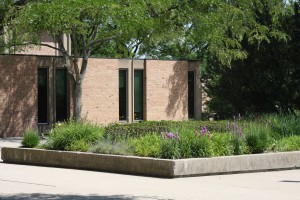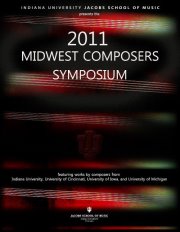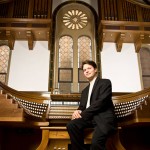 Early this week I posted my report on the 2011 Midwest Composers Symposium, wherein I mentioned the fact I had heard a lot of students’ music in a short amount of time. Well, the 30+ works I wrote about Thursday were just the beginning of my new music marathon because Midwest was immediately followed by last Monday’s student composers’ concert at the University of Michigan. That composers’ forum, the year’s second, was refreshingly brief in contrast to the preceding weekend’s protracted program, yet it contained delicious variety and a few personal debuts by composers I was not familiar with.
Early this week I posted my report on the 2011 Midwest Composers Symposium, wherein I mentioned the fact I had heard a lot of students’ music in a short amount of time. Well, the 30+ works I wrote about Thursday were just the beginning of my new music marathon because Midwest was immediately followed by last Monday’s student composers’ concert at the University of Michigan. That composers’ forum, the year’s second, was refreshingly brief in contrast to the preceding weekend’s protracted program, yet it contained delicious variety and a few personal debuts by composers I was not familiar with.
Monday’s concert began with an electro-acoustic work by Robert Alexander, an accomplished, technologically oriented composer/sound artist who I saw perform with the MiND Ensemble last Spring. Mr. Alexander’s piece, a line between two spaces (turning and turning and resting), featured composer David Biedenbender at the piano and a host of live electronic devices. As I gathered, the work was mainly improvised, though it seemed like the overall structure – mostly in terms of energy level – had been agreed on beforehand. Most remarkable about the piece is the way in which Mr. Alexander’s electronics interacted with the piano. At first, the piano’s sound is undistorted, with the first synthesized sounds regurgitating the piano’s music and then shifting the pitch ever so slightly. However, the electronics increasingly gain power over the piano, achieving a beautiful and stunning summit whereby the electronic part actually subsumes the acoustic space of the piano, and the instrument is no longer audible.
The next two pieces were beautiful songs performed by composers David Wolff (tenor) and Michael Schachter (pianist). First came Mr. Wolff’s “Of Mere Being”, an impressionistic setting of Wallace Stevens. With its impulsive musical moods, “Of Mere Being” reflects the text impeccably and expressively without being obvious. Moreover, Mr, Wolff’s performance, for both songs, was fantastic and demonstrative of his impressive musicianship. Mr. Schachter’s Pierrot (Heart), followed and didn’t shy away from the mantle of excellent vocal writing introduced carried by “Of Mere Being”. Pierrot sets a poem by Langston Hughes, and opens simply to establish a somber, contemplative space from which the narrator will tell his story. Like “Of Mere Being”, Pierrot merges the piano and singer into a single dramatic force that illustrates the text without being to transparent. Particularly important to the drama in Mr. Schachter’s work is the aforementioned simplicity of the opening material. This idea’s expressivity grows slowly, only to explode rather gloriously in the song’s captivating climax.



 David Lang is one of my favorite composers and among a handful of brave souls who created the vibrant new music scene we enjoy today. He and his Bang on a Can co-founders Julia Wolfe and Michael Gordon were writing, producing and getting their music played and recorded long before the coming of the internet, inexpensive recording technology, and a hip club scene made DIY SOP. He reminds me a bit of the hero in the old country song “I Knew Jesus Before He Was a Superstar.”
David Lang is one of my favorite composers and among a handful of brave souls who created the vibrant new music scene we enjoy today. He and his Bang on a Can co-founders Julia Wolfe and Michael Gordon were writing, producing and getting their music played and recorded long before the coming of the internet, inexpensive recording technology, and a hip club scene made DIY SOP. He reminds me a bit of the hero in the old country song “I Knew Jesus Before He Was a Superstar.”


